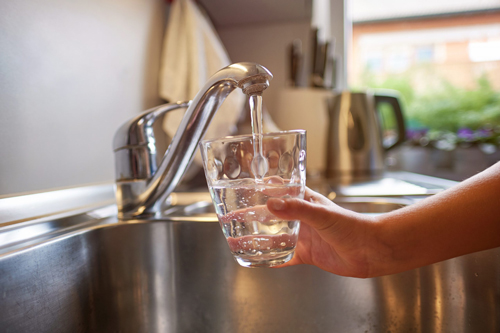Do you know what’s in your drinking water? Many homeowners think that their water is safe because it was treated at a municipal water treatment center, but there might still be hazardous contaminants lurking inside of it. Two of the biggest dangers in your water are aluminum and silica. Studies over a decade ago found that elevated levels of aluminum and silica in drinking water can lead to serious health effects, including an increased risk of Alzheimer’s disease. Here’s what you need to know about the risks associated with not treating water that has high levels of aluminum and silica.
All About Aluminum in Drinking Water
Aluminum is a very common metal that can be found many places naturally. It is present in the crust of the earth, so it can leach from soil and rocks into water sources. It can also be found in water in the form of aluminum hydroxide, which is a byproduct of the feeding of aluminum sulfate.
The levels of aluminum allowable in public drinking water supplies are regulated through Secondary Maximum Contaminant Levels (or SMCLs). These are used whenever the odor, taste or look of water might be negatively impacted. Both the World Health Organization and Environmental Protection Agency agree that aluminum levels above 0.1 ppm can impact the color of water, and the EPA encourages water treatment facilities to keep aluminum levels below 0.05 ppm whenever possible.
What Happens When There Is Aluminum and Silica in Drinking Water?
An alarming study in 2009 found that there was a link between aluminum and silica in drinking water and an increased risk of dementia, cognitive decline and Alzheimer’s disease in elderly participants who were followed over a period of 15 years. The researchers used both geographic exposure and individual exposure to account for each participant’s consumption of tap water and bottled water. The researchers found that those who had a higher intake of aluminum in their drinking water and higher geographic exposure to aluminum had greater cognitive decline and a significantly increased risk of dementia. Interestingly, the study found that there was a slightly reduced risk of dementia when participants ingested silica. If you have high levels of aluminum in your water, it’s important for you to take action.
How Can You Determine How Much Aluminum Is in Your Water?
The best way to determine exactly what is present in your water is with water testing from Atlantic Blue Water Center. Our water testing can measure a broad range of substances depending on your needs, and we can perform:
- Hard water testing
- Lead testing
- Potability testing
- Bacteria testing
- VOC testing
- MTBE testing
- pH testing
- Radon testing
- Nitrates testing
- And more!
To have your water tested, you can bring your own water sample to our full service laboratory or schedule a water test from one of our professionals at your home or business. Our technicians are specially trained and certified, and we use cutting-edge water testing methods that get results. All of our equipment, methods and personnel are fully certified by the Environmental Protection Agency. Determining whether or not you have aluminum present in your water is critical for your health, and once you get your test results we can help you determine the best path forward. We want to be your trusted resource for water testing now and in the future.

How Can You Remove Aluminum From Your Water?
Now that you know exactly how much aluminum or silica is present, you can take the time to remove aluminum and silica in drinking water at your home. Reverse osmosis systems are one of the most effective ways to remove excessive aluminum that can lead to dementia from your water. Reverse osmosis can reduce the aluminum content of drinking water by over 98%. A reverse osmosis system removes a broad range of contaminants, not just aluminum, from drinking water by pressure forcing it through a semipermeable membrane. Water that is filtered will flow from the untreated side that contains contaminants to the other side to provide you with safe, clean drinking water.
If you invest in a reverse osmosis system, it will help purify your water by going through multiple different filters. The sediment filter is the most rudimentary and designed to remove bigger particles like dust, rust and dirt. The carbon filter is much like the filters you could find in conventional water treatment options and it can reduce the level of chlorine, VOCs and contaminants present. The most thorough filter and the centerpiece of the system is the semi-permeable membrane. This is what removes up to 98% of total dissolved solids from the water to get it very clean.
Once the water has made it through each stage of the reverse osmosis system, it will be placed into a storage tank where it will be ready for your use whenever you need it. Your system will work until the storage tank is totally full and then shut off until you start using water again. If you are concerned that the water you drink might taste stale, don’t be! Once it exits the tank, it will go through one more polishing filter so that it is perfect and ready to drink when you get it from your faucet. Atlantic Blue Water Center can work with you to determine the perfect way to ensure your family is healthy and safe and only enjoying quality drinking water.
Make Sure That Your Home Water Supply Is Safe to Drink with Atlantic Blue Water Center
We provide water treatment and water softening solutions for homeowners that want a cleaner water supply and water that is free from hazardous carcinogens that can contribute to increased cancer risk. We’re also focused on providing additional education on water treatment, water quality, and issues associated with water contaminants. Call us at (410) 751-9200 to schedule your in-home water testing appointment today.
Make Sure That Your Home Water Supply Is Safe to Drink with Atlantic Blue Water Center
We provide water treatment and water softening solutions for homeowners that want a cleaner water supply and water that is free from hazardous carcinogens that can contribute to increased cancer risk. We’re also focused on providing additional education on water treatment, water quality, and issues associated with water contaminants. Call us at (410) 751-9200 to schedule your in-home water testing appointment today.
